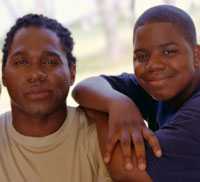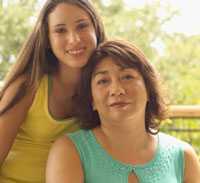Parent and Guardian Resources
Help your teen make healthy choices about sex.

Sexual development is a normal part of the teen years. Your teen needs your help in understanding his or her feelings, peer pressure, and how to say no if he or she does not want to have sex. If your teen starts having sex, he or she needs to know how to prevent pregnancy and sexually transmitted diseases. Teens want to talk with their parents about sex and relationships.
Parents have a strong impact on whether a teenager makes healthy decisions for himself or herself. This goes for making healthy decisions about sex, as well. Research shows that teens who talk with their parents about sex, relationships, birth control and pregnancy—
- Begin to have sex at later age.
- Use condoms and birth control more often if they do have sex.
- Have better communication with romantic partners.
- Have sex less often.
Resources
 Here are some resources—specifically for parents—where you can find information and tips to help you talk with your teen about sex, birth control, relationships, pregnancy, and other related topics.
Here are some resources—specifically for parents—where you can find information and tips to help you talk with your teen about sex, birth control, relationships, pregnancy, and other related topics.
Office of Adolescent Health: Talking with Teens
Research confirms what young people already know—what their parents have to say matters to teens. That's why parents play a powerful role in helping adolescents make healthy decisions about sex, sexuality, and relationships. But if you think talking to your son or daughter about sex is tough, or it makes you nervous, know that you're not alone. Lots of other parents feel the same way.
CDC’s Parent Portal
Information from across all of CDC for parents, covering everything from safety at home and in the community to immunization schedules and developmental milestones for ages 0–19 years.
Advocates for Youth
A resource for parents with Frequently Asked Questions, information on the importance of parents as sex educators, and tips on talking with teens.
American Academy of Pediatrics (AAP) Healthy Children: Teen Dating and Sex
Information designed especially for parents about information on all stages of child and adolescent development. This teen section provides information from pediatricians on talking with teens about numerous topics related to sex, sexuality, healthy relationships, and birth control.
National Campaign To Prevent Teen and Unplanned Pregnancy: Parent’s Portal
Tips and resources for talking with teen sons and daughters about sex and relationships, discussion guides, blogs and videos.
 Planned Parenthood Tools for Parents
Planned Parenthood Tools for Parents
Tools and information for parents on positive communication with teens to help them make healthy decisions about sex.
Find a family planning clinic near you
Family planning clinics across the country are available to provide women and men with reproductive health care. This clinic locator is provided by the Department of Health and Human Services,Office of Population Affairs (OPA). OPA serves as a focal point on a wide range of reproductive health care services and topics, including adolescent pregnancy, family planning, and other population issues.
Video Presentations
 Let's Talk About Sexual Health
Let's Talk About Sexual Health
Video for doctors and young adults on how to talk about sexual health.
Citations
Brody GH, Murry VM, McNair L, Brown AC, Molgaard V, Spoth RL, Gerrard M, Gibbons FX, Wills TA, Luo Z and Chen Y-F. The strong African American families program: prevention of youth’s high-risk behavior and a test of a model of change. Journal of Family Psychology 2006;20(1):1–11.
Haggerty KP, Skinner ML, MacKenzie EP and Catalano RF. A randomized trial of parents who care: effects on key outcomes at 24-month follow-up. Prevention Science 2007;8:249–260.
Hutchinson MK, Jemmott JB, Jemmot LS, Braverman P, Fong GT. The role of mother-daughter sexual risk communication in reducing sexual risk behaviors among urban adolescent females: a prospective study. Journal of Adolescent Health 2003;33:98–107.
Markham CM, Lormand D, Gloppen KM, Peskin MF, Flores B, Low B, House LD. Connectedness as a predictor of sexual and reproductive health outcomes for youth. Journal of Adolescent Health 2010;46:S23–S41.
McNeely C, Shew ML, Beuhring T, Sieving R, Miller BC, Blum RWm. Mothers’ influence on the timing of first sex among 14- and 15- year-olds. Journal of Adolescent Health 2002;31:256–265.
Prado G, Pantin H, Briones E, Schwartz SJ, Feaster D, Huang S, Sullivan S, Tapia MI, Sabillon E, Lopez B and Szapocznik J. A randomized controlled trial of a parent-centered intervention in preventing substance use and HIV risk behaviors in Hispanic adolescents. Journal of Consulting and Clinical Psychology 2007;75(6):914–926.
Martin JA, Hamilton BE, Osterman MJK, Curtin SC, Mathews TJ. Births: Final data for 2012. Natl Vital Stat Rep. 2013;62(9).
Martinez G, Copen CE, Abma JC. Teenagers in the United States: Sexual activity, contraceptive use, and childbearing, 2006–2010. National Survey of Family Growth. National Center for Health Statistics. National Vital Health Stat. 2011;23(31).
Singh S, Darroch JE. Adolescent pregnancy and childbearing: levels and trends in developed countries. Fam Plann Perspect. 2000;32(1):14-23.
National Campaign to Prevent Teen and Unplanned Pregnancy, Counting It Up: The Public Costs of Teen Childbearing 2014. Accessed May 21, 2014.
Perper K, Peterson K, Manlove J. Diploma Attainment Among Teen Mothers. Child Trends, Fact Sheet Publication #2010-01: Washington, DC: Child Trends; 2010.
Hoffman SD. Kids Having Kids: Economic Costs and Social Consequences of Teen Pregnancy. Washington, DC: The Urban Institute Press; 2008.
Kirby D, Laris BA, Rolleri L. The Impact of Sex and HIV Education Programs in Schools and Communities on Sexual Behaviors Among Young Adults. Scotts Valley, CA: ETR Associates; 2006.
- Page last reviewed: April 19, 2017
- Page last updated: April 19, 2017
- Content source:


 ShareCompartir
ShareCompartir